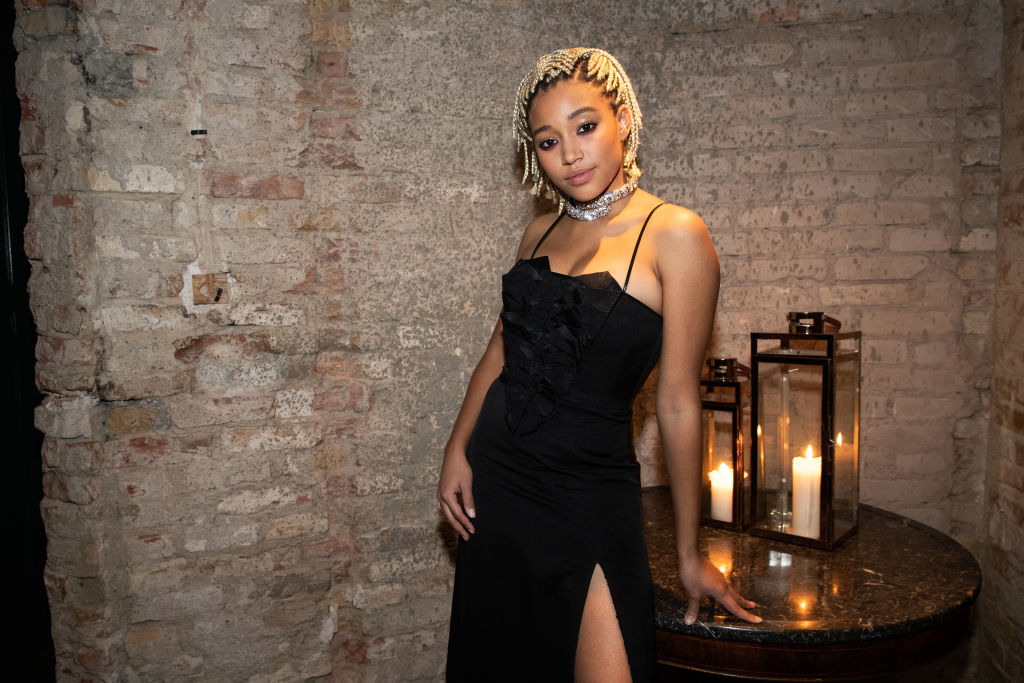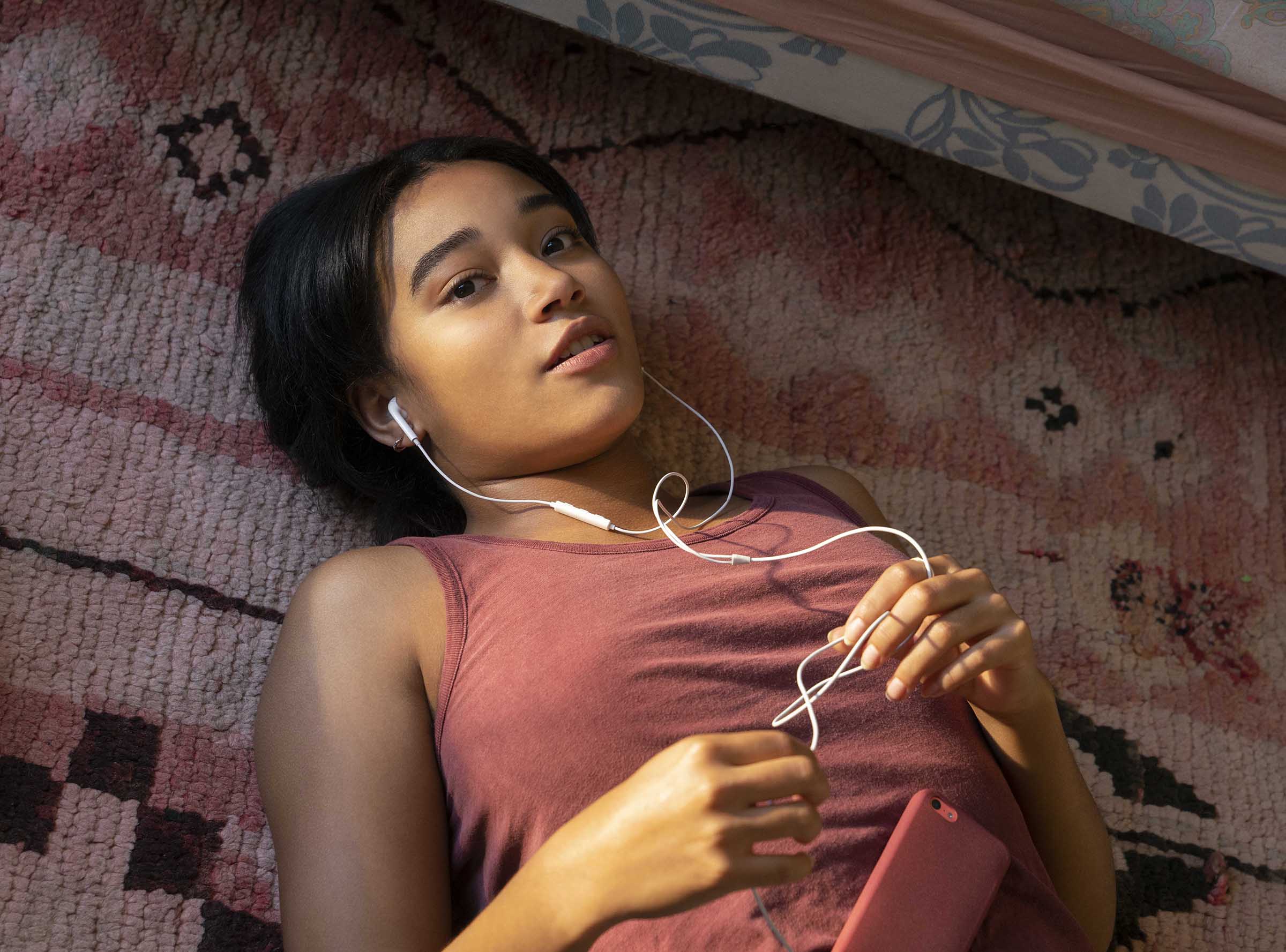
- Interviews
The Quarantined Talent: Amandla Stenberg, Much More Than “The Eddy”
In October 2018, when she was only 19, Amandla Stenberg was featured on the cover of TIME magazine as a Next Generation Leader. At the time she had just starred in The Hate U Give, directed by George Tillman Jr. from the novel by Angie Thomas about the police killing of an unarmed black man. In The Eddy, a new Netflix series created by Golden Globe-winning director Damien Chazelle (La La Land), she plays Julie, an American teenager moving from New York to Paris to live with her musician father (André Holland) who runs a jazz club.
Born in Los Angeles on October 23, 1998, Amandla is biracial – her father, Tom Stenberg, is Danish, and her mother, Karen Brailsford, is African American. Her name means “power” in the South-African Nguni languages and was a popular rallying cry during the resistance against apartheid. Meeting virtually with HFPA journalists, the young actress explains, “My mom is a powerful, intelligent, cultured black lady, who wanted to give me a name that meant something politically because she believes in the power of names to inspire the way that someone lives their life.” The name was also inspired by the Miles Davis 1989 album Amandla.
Stenberg played Rue, the 12-year-old tribute who helps Katniss (Jennifer Lawrence) and is killed, in The Hunger Games (2012) directed by Gary Ross from the novel by Suzanne Collins. She said that she saw her favorite fantasy books when she was younger, like the Harry Potter series, The Lord of the Rings, and Game of Thrones reflected in her life. The young actress has also spoken of connecting to the experience of Starr (her character in The Hate U Give), because “I grew up living in a lower-income black community,” but, after going to public school until 6th grade, for middle and high school, “I started attending a white private school across town on the Westside,” where she was faced with “a lack of awareness about racism,” which is not about “saying the ‘n word’, but in today’s day and age is pervasive in a lot of really subtle and insidious ways.”
In 2015 she made a video for her history class, Don’t Cash Crop My Cornrows, denouncing white appropriation of black culture. She shared it on Tumblr and it went viral. In a 2018 HFPA video interview, she stated: “I started being vocal about issues that I cared about, especially around blackness and cultural appropriation, all the unfair dichotomies that exist in America, because of the legacy of slavery.” At age 16, she was named ‘Feminist of the Year’ by the Ms. Foundation for Women, founded by Gloria Steinem in 1972. As to what being a feminist means to her generation, as opposed to the second-wave feminism of the early ‘70s, she says, “Our wave of feminism feels less about equality between the sexes or trying to ensure that women have the same rights as men. Now it’s much more inclusive of all people, wherever they exist on the gender spectrum, we are trying to deconstruct the patriarchal system that affects everybody.”
At 17 Stenberg applied to and was accepted to NYU film school, because she wanted to study directing under Spike Lee and Ava DuVernay, but she did not go, because, after she started acting in movies, she realized that, “to understand how different directors work has been the coolest, most amazing thing ever, and the best film school.” She sympathizes with Julie in The Eddy, because “I have grown up with close friends who have substance abuse issues, but there’s something about Julie that’s a universal adolescent experience of trying to find the footing underneath your feet.” While Julie plays the clarinet, Amandla plays guitar and the violin, her parents played jazz for her all the time when she was growing up, and her favorite jazz singers are Billie Holiday and Ella Fitzgerald.

Amandla Stenberg is a scene from The Eddy
Netflix
At various times in her life, Stenberg has identified as bisexual, pansexual, lesbian, gay, queer, trans-non-binary, preferring they/them pronouns to she/her, but she said that part of growing up is not finding a fixed idea of who you are, but rather being different all the time, changing and being fluid. From her point of view gay rights, race and feminism are all intertwined, because people experience all kinds of prejudice. She clarifies: “In terms of existing in a queer community, that is about ensuring that everybody feels safe, that their gender is being respected. Our trans friends, who exist in places that are more dangerous, need extra protection”
As her inspiration, Stenberg cites first her own mother, a spiritual counsel and writer, then Audre Lorde, the feminist poet, and civil rights activist, “I recently read her autobiography and it felt so powerful, it encapsulated being a black woman existing in a queer intersection,” also Angela Davis, the Marxist feminist supporter of the Black Panther Party.
When asked how she is using her social media presence to communicate her thoughts about the coronavirus pandemic to her millions of Instagram followers, she replies, “I’m trying to encourage people to stay at home and to put their resources in places that are productive, to help people who are in really precarious positions, to apply some collective healing, grounding, breathing, because I feel like that’s what we need to be doing right now.”

